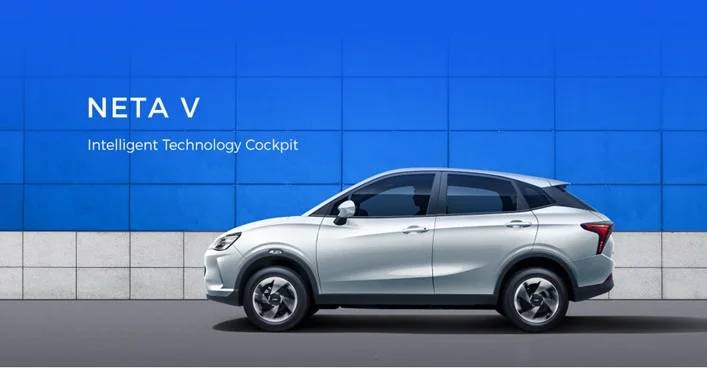Hozon EV Division Launches Production at First International Plant in Thailand

With the opening of its first foreign electric vehicle (EV) plant in Thailand, Neta Auto has increased its footprint in the Southeast Asian nation, where the government is attempting to promote the use of battery-powered vehicles as part of its decarbonization efforts.
According to a news statement from Neta Auto, the EV brand of Chinese automaker Hozon New Energy Automobile Co. Ltd., the plant is anticipated to have an annual capacity of 20,000 cars, with large-scale manufacturing slated to commence in the first quarter of 2024.
The first vehicle, a Neta V-II electric subcompact crossover, rolled off the assembly line at the Thai factory on Thursday. According to a separate statement from the company, Neta Auto hailed this as a “important step” in its global expansion strategy as it aims to produce more pure electric cars to meet the growing demand in Thailand and other ASEAN countries.
In August 2022, Neta Auto made its first attempt at international expansion by introducing the low-cost Neta V electric subcompact crossover, which was built in China, to the Thai market. With 9,294 sales in the first three quarters of 2023, the Neta V was the second-best-selling EV car in Thailand.
Thailand introduced the EV3.0 program last year, which offers different financial incentives for imported passenger electric cars according on the battery specifications. The proposal exempts some imported passenger car models from import and excise tariffs until the end of 2023. However, by the end of 2024, manufacturers wishing to take advantage of the subsidies would need to match the imports with a 1:1 local production ratio.
In an effort to encourage more domestic investment, the government unveiled the EV3.5 program last month. Under this program, which reduces cash subsidies, automakers seeking to receive the subsidies must manufacture two EVs domestically for each imported EV by 2026 and three domestically manufactured EVs by the end of 2027.
According to Bao Zhuangfei, general manager of Neta Auto’s activities in Thailand, Neta Auto is one of four Chinese automakers that have taken part in the EV3.0 program. As per reports. According to Bao, the other three are BYD, Great Wall Motor Co. Ltd. , and SAIC Motor Corp. Ltd.
Given that Thailand’s government wants 30% of all automobiles made there to be zero-emission vehicles by 2030, the country has become a popular destination for Chinese electric vehicle makers. The nation has committed to reaching net zero emissions by 2065 and carbon neutrality by 2050.
The first batch of the totally electric MG4 came off the assembly line in early November at a Thai plant run by a joint venture between Bangkok-based Charoen Pokphand Group Co. Ltd. and SAIC. According to a SAIC statement, those vehicles were the first fully electric vehicles to be assembled in Thailand.
BYD put an agreement in September of last year to construct its first overseas facility in Thailand. With an estimated yearly capacity of 150,000 EVs, the plant is expected to begin operations in 2024. At the time, the EV juggernaut stated that it will primarily supply Southeast Asian markets.
According to a business insider who spoke with Caixin, Great Wall Motor has begun testing the Ora Good Cat pure electric small car in Thailand. Formal manufacturing is anticipated to commence by the end of this year.
Plans to establish a manufacturing presence in Thailand have also been revealed by state-owned Chongqing Changan Automobile Co. Ltd. and the electric vehicle brand Aion from Guangzhou Automobile Group Co. Ltd.
Aion, which currently exports electric vehicles to the nation, announced on Wednesday that it was getting ready to build a plant there with a planned 50,000 vehicle annual manufacturing capacity. There will be two stages to the construction, the first of which is scheduled to end in July 2024.
At a corporate event on Monday, Changan Auto Chairman Zhu Huarong announced that the company’s production site in Thailand will begin operations in the first quarter of 2025. According to Zhu, the automaker also intends to introduce its new-energy vehicle brands, Avatr, Deepal, and Nevo, to the Thai market.
According to Autolife Thailand, during the first three quarters of this year, 50,347 pure electric vehicles were registered in Thailand, with over 80% of them being Chinese models.